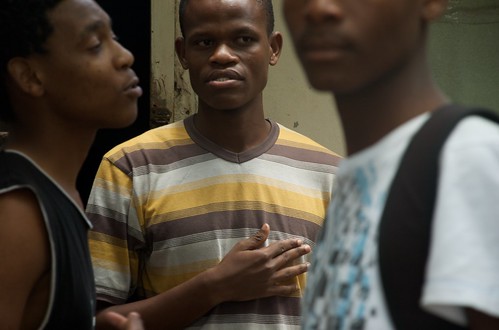Following the workshop we did two months ago on blogging and digital storytelling at K-CAP in Kwa Mashu, South Africa, yesterday I returned to Durban's largest township for a followup workshop. We reviewed the three films the K-CAP bloggers produced during my last visit and everyone offered feedback about what was well done and what could be improved. Ncebo and Sinempilo felt that Gugu and Sam did a great job as hosts. They were energetic and clear speakers. Zwelithini thought that Sibonelo's song was perfect background music. Thandanani felt that the video tour of Kwa Mashu should have been longer so as to highlight the community's rich cultural heritage.

All of the K-CAP bloggers were excited to learn that when searching Google for “Kwa Mashu” their blogs are among the first results. They apologized for not having blogged frequently over the past few months, but explained that they have been busy with their performing arts responsibilities at Ekhaya Multi Arts Centre. In fact, Gugu, who was not able to attend the followup workshop, is soon headed to Paris where she will perform a contemporary dance routine with fellow dancers and performing artists from Kwa Mashu. In the last couple days Sinempilo has written a new post about HIV in South Africa and Thandanani has written about a new project of his which aims to teach young people from his community about their culture.
We then pulled out our notebooks to brainstorm what we wanted to cover in the videos we would produce together. Thandanani and Zwelithini were insistent that we show the positive side of Kwa Mashu rather than the same negative news of violence and political bickering that so often features in the local newspapers. One of the best things that Kwa Mashu has going for it right now, they said, was right there at the Ekhaya Multi Arts Centre. It gives young people from the community a creative outlet and business opportunities which serve as an incentive to work hard instead of going out to clubs and becoming involved in violence. They decided that they wanted to do a more in-depth look at Ekhaya Multi Arts Centre.
Most of the young performing artists didn't know the history of the center or how it came about so they prepared interview questions for some of the staff members who have been around the longest. It turns out that the janitors were among the most knowledgeable in terms of how the center has helped change Kwa Mashu and how the community itself has changed since the end of apartheid and the election of Nelson Mandela in 1994. Unlike the previous three videos we made in September, this time they wanted to record the majority of the film in the language they feel most fluent in, Zulu. Though they do want the international community to learn more about Ekhaya Multi Arts Centre and Kwa Mashu, they feel that they can express themselves better in their own language.
As a compromise, they decided that Thandanani and Ncebo (“Felix”) would be co-hosts of the program with Ncebo introducing each segment in Zulu and Thandanani adding context in English. They also plan on adding Zulu captions and English sub-titles in the near future. After touring Ekhaya Multi Arts Centre they decided on producing two other videos: one on Sibonelo's bedroom music studio where he is currently recording a demo CD for the Kwa Mashu hip-hop group Toxic and another featuring a discussion by Thandanani, Sinempilo, and Zwelithini about AIDS in Kwa Mashu and whether or not it's a good idea to get tested. We'll be uploading those videos in the coming week.




2 comments